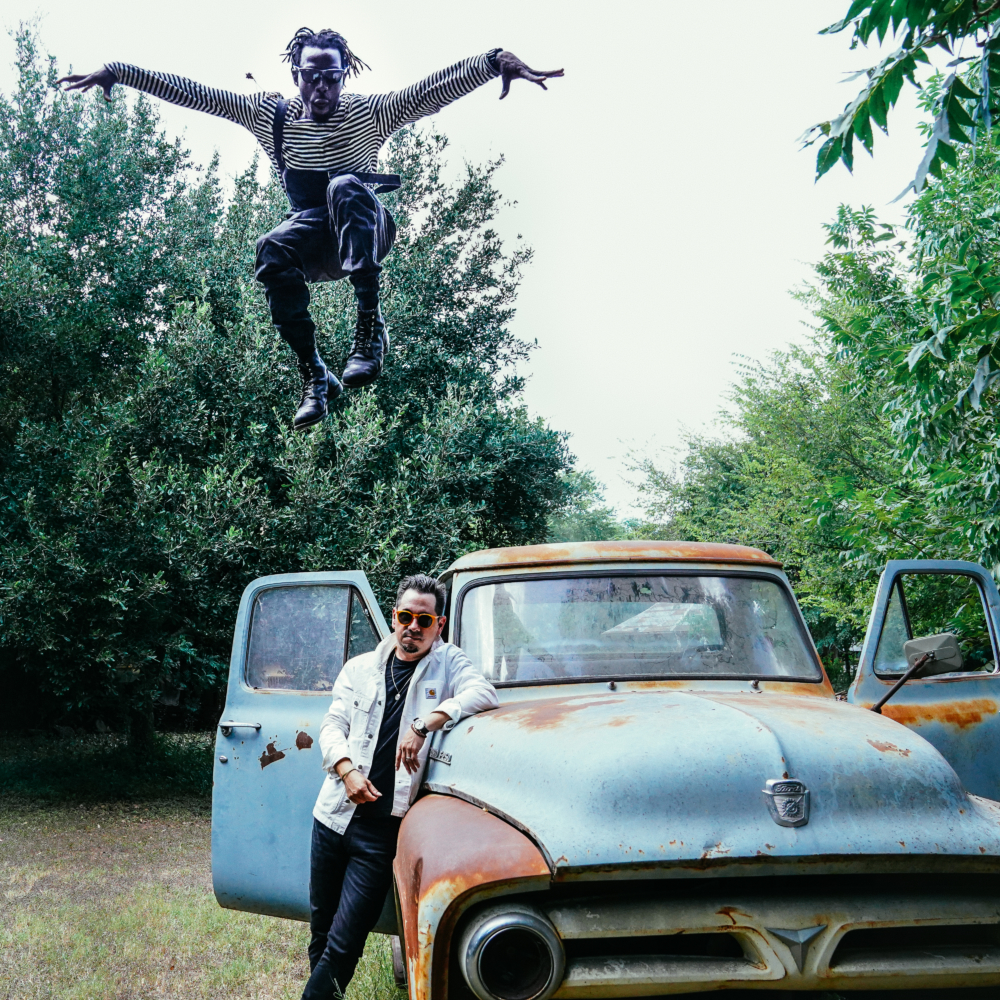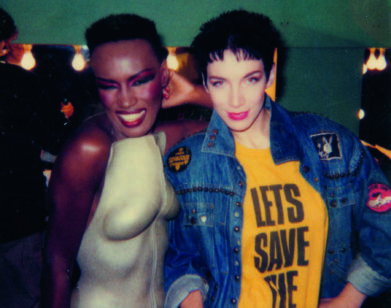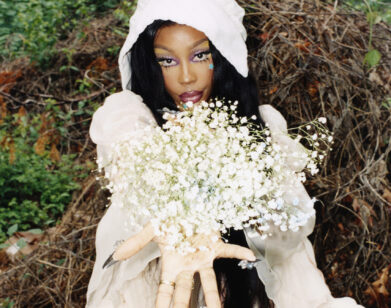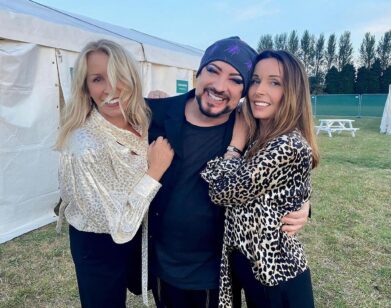Black Pumas Are Listening to Kendrick Lamar and “Careless Whisper”
This is “Add to Queue,” our attempt to sort through the cacophony of music floating in the algorithmic atmosphere by consulting the experts themselves. Our favorite musicians tell us about their favorite music—the sad, the happy, the dinner party-y, the songs they want played at their funeral. We’re merely days into 2020, and Black Pumas, the funk-soul duo composed of vocalist Eric Burton and guitarist/producer Adrian Quesada, are already having a breakout year. After releasing their debut album last June, they were nominated for Best New Artist at this year’s Grammys (going up against Billie Eilish and Lizzo, among others), and they’ll head to Coachella this April to play alongside Lana Del Rey, Emotional Oranges, (Sandy) Alex G, and Lil Nas X. Quesada—formerly of Grupo fantasma, which took the the Grammy for Best Latin Rock Album in 2011—met Burton in Austin, where the former busker had made his way after working through Los Angeles. The result is a band heavily steeped in the sounds of Motown and ’70s rock, with a dash of early-aughts hip-hop and Neil Young. We caught up with the duo to discuss what they’ve been listening to, their favorite songs of the last decade, and how George Michael‘s “Careless Whisper” is the Swiss Army knife of songs.
———
MARK BURGER: What was the last song you listened to?
ADRIAN QUESADA: It was a group called the Bishop out of Austin, Texas: The Bishops. My wife just played that in the car.
ERIC BURTON: The last song that I listened to was “Me and My Shadow” by Peggy Lee.
BURGER: Do you remember the first album that you bought?
QUESADA: I remember for sure. It was Beastie Boys, Licensed to Ill. I remember when it came out. I bought it on CD, I had it on tape, I had it online.
BURGER: Dedicated.
QUESADA: Oh yeah.
BURTON: First album I bought was 50 Cent’s Get Rich or Die Tryin’. I went to Walmart, got the CD with my little brother, and I listened to it on a CD player while jumping on the trampoline we had.
BURGER: Do you remember who your first concert was?
QUESADA: My first concert was a rapper named Mellow Man Ace. He was the brother of Sen Dog from Cypress Hill. He was a Cuban rapper, and I think he may have been the first Latin rapper with a hit song. He came to Laredo and I went and saw him. We didn’t get a lot of concerts down there, but I do remember that. Years later, I actually ended up working on a song with him and told the whole story.
BURTON: I’d have to say my first concert was probably a church revival event. I was going to a church and listening to the different choirs from around the town come together and sing their best numbers.
BURGER: What are your earliest musical memories?
QUESADA: MTV was how I discovered a lot of music. I grew up in South Texas and it was a little bit isolated from any major cities where I would have been exposed to that. At the time was Alternative Nation, 120 Minutes, Yo! MTV Raps, Club MTV. All those shows I discovered opened up many doors of musical paths that I would eventually follow. As far as actually making music, I actually remember being a little kid and playing the air guitar with tennis rackets and pretending I had a microphone and sort of lip syncing along by myself to things I saw on TV. But I don’t think I actually played an instrument until I started playing guitar when I was maybe 13 years old. Around the same time, I had a little keyboard that I would mess around with as well. But my earliest musical memories were actually a little bit of a rigid guitar regimen, because I’ve studied classical and flamenco for a couple of years. I didn’t have the entryway that a lot of kids do just by jamming in a garage with friends. It’s actually was a little bit more of an academic approach. Learning how to read music and playing music that was not the easiest to start off with.
BURTON: My uncle was a big part of my life. He was a musician and a songwriter. When would babysit us, we would play melody games. So when I was about 9 or 10 years old, I would compete with my younger siblings and my sister in melody games—we would compete for snacks, small change, $3, $5. We would create a seven note melody, like one melody line. So at an early age, we would compete against each other when we went Uncle Steven’s. That’s my earliest memory of making music.
BURGER: Who is your dream collaborator working today, and of all time?
QUESADA: I would say Jay-Z, probably for both.
BURTON: Because I was the only sibling that continued to pursue music after the “melody games,” and I have a really close relationship with my siblings, my dream collaborator would be with my little brother. I wish that he would pursue making music and collaborate with me because he’s really talented and I’m a family man, I guess.
BURGER: What is a song that always puts you in a good mood?
BURTON: Mine is “They Reminisce Over You” by—
QUESADA: Pete Rock & CL Smooth! I was actually going to say that one. I’ll give the same answer too.
BURGER: This can be like a collaborative playlist moment: what are some songs that you would put on a road trip playlist?
QUESADA: That one for sure, the one we both said. I would say Pastor T.L. Barrett, “Nobody Knows” and Serge Gainsbourg, “Requiem Pour Un Con.”
BURTON: I would add “Adam and Eve” by Nas, I would add the whole good kid, M.A.A.D. city album by Kendrick Lamar. I would also add “Old Man” and “Heart of Gold” by Neil Young.
QUESADA: “Magic Sam’s Boogie.”
BURTON: Yeah, there you go. Al Green’s “Love and Happiness.” Otis Redding, “(Sitting On) the Dock of the Bay.” Aretha Franklin‘s “I Say a Little Prayer.”
QUESADA: Charles Mingus, “Moanin’.”
BURTON: Sister Nancy’s “Bam Bam.”
BURGER: What about for a dinner party playlist?
QUESADA: Dinner party would be, I think, the whole Charles Mingus Blues and Roots album. That’s good background to dinner party music. This might be too sad, but I listen to Roberta Flack’s First Take album a lot. It gets heavy on the heart, but it’s good music.
BURGER: Would you put her on a “crying in your bedroom” playlist?
QUESADA: That’s number one on my crying in my bedroom playlist. Nothing comes close.
BURTON: Black Magic by Magic Sam, Charles Bradley’s Black Velvet, Marvin Gaye, In The Groove. I’m kind of a nerd for Glen Campbell. I just love the way he writes songs—“Galveston” and “Witchita Lineman.”
QUESADA: Michael Kiwanuka‘s Love and Hate.
BURGER: For the dinner party or for the crying in your bedroom?
BURTON: Crying in your bedroom.
BURGER: Maybe it’s both? Maybe it’s a sad dinner party.
BURTON: All right. What about crying in my bedroom… Al Jarreau did a cover of “Your Song” that’s, like, so cool. I don’t know if I would cry to that, but I really liked that cover. Let’s see. Probably The Temptations—what’s a good Temptations album?
QUESADA: Psychedelic Shack is one that’s really good.
BURTON: Yeah, that’s a good one.
BURGER: Do you have a go-to karaoke song?
QUESADA: You don’t want to hear me do karaoke, but George Michael‘s “Careless Whisper.”
BURGER: Yes!
I feel like “Black Moon Rising” set the tone for what we were going to do in the future nicely.BURTON: And when Adrian sings that song, I leave the party. I don’t even sing the song.
QUESADA: Yeah, no doubt. [Laughs.] That’s when people start crying at the party.
BURTON: That’s a good question because I don’t even do karaoke. I don’t know what I would do.
QUESADA: “Fast Car”?
BURTON: Yeah, there you go. “Fast Car” by Tracy Chapman.
BURGER: That would also work for crying in your bedroom.
BURTON: There you go, that works.
BURGER: Do you have a guilty pleasure song?
QUESADA: George Michael’s “Careless Whisper.”
BURTON: Oh my god. My guilty pleasure song is George Michael’s “Careless Whisper” covered by Adrian.
QUESADA: [Laughs.] Very little pleasure. It’s more guilt.
BURGER: What’s the song that describes your life right now?
QUESADA: George Michael’s—no, just kidding.
BURGER: It’s the Swiss Army knife of songs.
QUESADA: No, let me think of one. The Beatles’ “A Day In The Life”—it’s not so much lyrically what I’m going through, but I turned my daughter onto it, and she’s been playing it on the piano a lot lately. It’s a sweet kind of feeling hearing my daughter want to learn how to play. We’re about to learn together how to play it on guitar and piano.
BURTON: Mine would be Michael Kiwanuka‘s “Home Again.”
BURGER: Is there a song or a band that you wish the world knew more about?
BURTON: Probably Michael Kiwanuka, for me.
BURGER: Do you have a favorite song from the last decade?
BURTON: good kid, M.A.A.D city. I love that album. I was really into Man on the Moon by Kid Cudi when that came out. I was in high school. Did that Pastor T.L. Barrett come out this decade?
QUESADA: It came out a while back, but I think it got re-released in the last decade. That’s a great one. Actually, Eric turned me onto good kid, M.A.A.D city, and I’ve been playing that on repeat lately.
BURTON: It’s probably my favorite album too. I don’t know if it was a re-release, but the band called Death—they were a punk band, three black brothers—I know that they recorded an album a long time ago, but it recently resurfaced and it’s probably released in the last ten years. …For The Whole World To See.
BURGER: Do you have a favorite song that you’ve written?
QUESADA: That’s tough, because they’re almost like our kids. Between the two of us, I feel like “Black Moon Rising” set the tone for what we were going to do in the future nicely.
BURTON: That was kind of our opus, for sure. We recorded that the first time we got together. I’d have to agree. I think that’s a good one.
BURGER: What do you think music will sound like 50 years from now?
QUESADA: I hope that it would retain a human element. Sometimes it gets lost. It’s not that I’m totally anti-technology or anything like that in music by any means, but when it loses a little bit of the human element and goes too far in one direction, I think it loses what people connected to in the first place. But I’d imagine that there’s going to be either a lot more leaning towards technology, or, at the same time, people reacting against that and going back to the raw basics of playing instruments.
Listen to Black Pumas’ “Add To Queue” playlist below, and follow Interview on Spotify for more.







